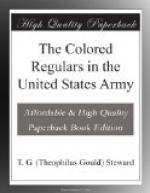The intimate association of “officer” and “gentleman,” a legacy of feudal days, is not without significance. An officer must also be a gentleman, and “conduct unbecoming an officer and a gentleman” is erected into an offence punishable by dismissal from the service. The word “gentleman” has got far away from the strict significance of its French parent. De Tocqueville has made us see the process of this development. Passing over to England, with the changing conditions, “gentleman” was used to describe persons lower and lower in the social scale, until, when it crossed to this country, its significance became lost in an indiscriminate application to all citizens[27]. A flavor of its caste significance still remains in the traditional “high sense of honor” characteristic of our military service. It was a distant step for a slave and freedman to become an officer and gentleman.
While the above reflections may be some explanations in fact for the opposition to the commissioning of Negroes, there was no one with hardihood enough to bring them forward. Such notions might form the groundwork of a prejudice, but they could not become the reason of a policy. It is an instinctive tribute to the good sense of the American people that the opponents of colored officers were compelled to find reasons of another kind for their antagonism.
The one formula heard always in the campaign against colored officers was: Negroes cannot command. This formula was sent forth with every kind of variation, from the fierce fulminations of the hostile Southern press, to the more apologetic and philosophical discussions of our Northern secular and religious journals. To be sure, every now and then, there were exhibitions of impatience against the doctrine. Not a few newspapers had little tolerance for the nonsense. Some former commanders of Negro soldiers in the Civil War, notably, General T.J. Morgan, spoke out in their behalf. The brilliant career of the black regulars in Cuba broke the spell for a time, but the re-action speedily set in. In short it became fastened pretty completely in the popular mind as a bit of demonstrated truth that Negroes could not make officers; that colored soldiers would neither follow nor obey officers of their own race.
This formula had of course to ignore an entire epoch of history. It could take no account of that lurid program wrought in the Antilles a century ago—a rising mob of rebel slaves, transformed into an invincible army of tumultuous blacks, under the guidance of the immortal Toussaint, overcoming the trained armies of three Continental powers, Spain, England and France, and audaciously projecting a black republic into the family of nations, a program at once a marvel and a terror to the civilized world.




